CubaDebate 174
Fake News About Cuba via Facebook

US Uses Facebook to Spread Fake News About Cuba
 August 22, 2018.
August 22, 2018.
By Rosa Miriam Elizalde
Cuban journalist. First Vice-President of UPEC and Vice-President of FELAP. She is a Doctor in Communication Sciences and author or co-author of the books “Antes de que se me olvide”, “Jineteros en La Habana”, “Clic Internet” and “Chávez Nuestro”, among others. He has been awarded the “Juan Gualberto Gómez” National Journalism Prize on several occasions. Founder of Cubadebate and its Editor-in-Chief until January 2017. On twitter: @elizalderosa
Translated and edited by Walter Lippmann for CubaNews.
While the United States is making a scandal about the supposed Russian intervention in social networks to influence the 2016 elections won by Donald Trump, today evidence has been uncovered that the U.S. government is using Facebook to spread fake news about Cuba and clandestinely foment dissidence on the island.
The Florida weekly Miami New Times revealed Wednesday that it has had access to documents from the government’s Office of Broadcasting to Cuba (OCB), run by Radio and TV Martí. It reveals that the Trump administration has been using Facebook accounts for two years that appear “native” (from real people on the island) to spread propaganda without informing Cuban Facebook users that it is government advertising.
According to the report obtained by the weekly, due to the failure of Radio and TV Martí,
the OCB’s strategy has focused on an offensive through social networks, based on metrics that place YouTube, Google and Facebook among the most visited sites in Cuba. With the use of AVRA (Audio and Video for Radio) technology, Radio Martí’s programs began to be broadcast through Facebook Live along with TV Marti’s programming. This provides OCB with additional efficient and cost-effective distribution output for both its radio (now visual radio) and TV content.
In fiscal year 2018, OCB has been establishing itself with digital island equipment (read “dissidents” paid for by the US) that creates native and “unbranded” Facebook accounts to disseminate information. Native” pages increase the chances of appearing in the news for Cuban Facebook users. The same strategy will be replicated in other preferred social networks.
Miami New Times says that the documents do not explain what federal agents mean by “unbranded” or “native” Facebook pages, but it is clear that they must resemble the pages of regular social network users to persuade Cubans to read propaganda from Radio and TV Martí.
According to the weekly, both government broadcasters have spent more than $800 million from the U.S. taxpayer over the years in their unsuccessful effort to influence Cuban public opinion.
This plan fits into a long history of attempting to use technology to fit propaganda against Cuba, says University of Pennsylvania professor John S. Nichols.
“There are certainly warning signs here,” says Nichols, co-author of Clandestine Radio Broadcasting: A Study of Revolutionary and Counterrevolutionary Electronic Communication (1987), about OCB’s efforts. “It is the latest plan in a long list of efforts by Radio and TV Martí and their predecessors to try to overcome the laws of physics…. Every time they fail to get their message to Cuba, they say there has to be some technological solution.
Instead, he adds, Congress “seems to fail to recognize that both stations are a colossal failure. It’s sad because they’re spending taxpayers’ money. But what’s really being wasted is our credibility as a great nation doing this kind of thing, dumb and stupid.
Prominent figures from both sides of the U.S. political spectrum, including Republican Senator Jeff Flake of Arizona, have described these OCB programs as counter-productive and a waste of money. Democratic representative Betty McCollum liquidated the AeroMartí platform in 2015 (to transmit to from an airplane to Cuba the broadcasts of Radio and TV Martí) and said that the OCB was an “unnecessary” office.
“Radio and television Martí are old-fashioned Cold War artifacts,” McCollum said in a statement in 2015. “Our taxpayers shouldn’t be funding propaganda broadcasts.”
But the programs continue to exist thanks to a handful of anti-Cuban lawmakers, including Miami representative Mario Diaz-Balart, a longtime promoter of Radio and TV Martí, says the Miami New Times.
Earlier this year, Senator Marco Rubio helped install Tomás Regalado, an old friend, as head of the Radio and TV Martí programs. Since then, Regalado has made great promises about how both stations have new plans to reach “5 million” Cuban citizens in the coming years. Regalado appeared last week on the Spanish-speaking MegaTV network to brag about the use of mysterious new technologies that the Cuban government supposedly cannot block. He said that 200 Cubans had received receivers that would help in this new attempt.
“It’s a technology that didn’t exist, and since the government doesn’t know about it, it will be almost impossible to block it,” Regalado told the cameras.
Nichols argued to the Florida weekly that this type of social media propaganda is damaging the U.S. position in the world.
“Third countries see what we are doing and say,’Here comes America again doing this nonsense,” and he adds,’It’s low, petty and not worthy of great power. Other countries will say,’If the U.S. is willing to violate international law, why should we obey our contractual obligations? And given what Radio Martí and TV Martí might be doing right now, we have a hard time complaining about what other countries might be doing against us.
The report that Miami New Times had access to is OCB’s budget request for fiscal years 2018 and 2019. It does not reveal the identities of fake “native” and “unbranded” accounts created on the social network, but Facebook administrators do know what they are. By these extravagant quirks in life, this information coincides with the decision of the social network founded by Marc Zuckerberg to eliminate hundreds of alleged false accounts of Russians and Iranians allegedly involved in several disinformation campaigns.
Will Facebook also eliminate the false accounts created by the U.S. government for regime change in Cuba and will the U.S. Attorney’s Office appoint Robert Mueller or another of his ilk to investigate these abuses, as it has done to determine alleged Russian interference through Facebook in the 2016 elections?
Failed saga of Radio and TV Martí
1985: Radio Martí began broadcasting, and five years later, the television aggression began when a television transmitter was put into service on board a captive aerostat at an altitude of 3,000 meters in one of the keys in the south of the state of Florida.
2005: Hurricane Dennis disappeared the captive balloon located at 10,000 feet above sea level in Cudjoe Key, from where Television Martí was broadcast. The OCB replaced it with the AeroMartí platform.
2014: OCB created the unwanted text messaging service Pyramid, which failed. Then it tried to smuggle small satellite devices into the island, but the project was aborted because in addition to being expensive, the “dissidents” used the terminals to view pornography.
2015: Deactivation of “AeroMartí”.
2018: President Trump created the Internet Task Force for Cuba, which according to the State Department “will examine the technological challenges and opportunities for expanding access to the Internet and independent media in Cuba. Clearly, this Task Force has encouraged OCB’s digital fantasy.
Several investigations by the Government Accountability Office (GAO) have acknowledged that there is strong evidence that Radio and Television Martí is not heard or seen in Cuba. According to the Miami New Times, this saga has cost the American taxpayer more than $800 million.
TAKEN FROM: Desbloqueando Cuba
Aretha Franklin

Aretha Franklin, the Great Queen of Soul, has died
August 16, 2018
Translated and edited by Walter Lippmann for CubaNews.
Aretha Franklin won 44 nominations, 18 Grammys and 75 million records sold
The diva from Memphis had been fighting cancer for years.
Franklin still had time to make one last record, A Brand New Me.
She went on to replace Luciano Pavarotti at the 1998 Grammy Awards.
There are few black voices left of the old guard. One of the most imposing ones has departed. Perhaps the most recognizable, the one that became immense by singing Respect and that had the pleasure of finishing off the work with other unforgettable melodies such as Natural Woman, I Say a Little Prayer or Chain of Fools, a church voice that made the leap into the commercial arena and that, after 44 nominations, 18 Grammys and 75 million records sold all over the world, became the first woman to access the Rock and Roll Hall of Fame, a year before The Beatles. The queen of soul, the eternal Aretha Franklin, has passed away. She was 76 years old.
Aretha Franklin’s representative confirmed to the Associated Press that the queen of soul had died Tuesday at her home in Detroit. On Sunday, information began to circulate about the singer’s admission to a hospital in Detroit, the city where she lived. It was said that she was in an extremely serious condition and that she was surrounded by her closest family and friends, as a clear sign of her impending end.
The Memphis diva had been struggling with cancer for years – even though she had never officially recognized it – and last year announced that she was retiring from show business for good. “This will be my last year. I’ll be recording, but this will be my last year of concerts. That’s all,” she said in an interview in 2017
“I feel very enriched and satisfied with where my career comes from and where it is.
All this after she was forced to cancel a series of concerts during the summer and could not be at a jazz festival in New Orleans. “Aretha Franklin has been ordered by her doctor to stay off the road (because of the music tours) and rest completely for the next two months,” the singer’s team announced in a statement in March.
Elton John will be able to brag about getting her on stage one last time. She was in November in New York to raise funds for the fight against AIDS. And former President Barack Obama was able to count on the strength of her voice at the 2009 presidential inauguration, in one of her most notable and remembered public events in her homeland. She did the same with Jimmy Carter and Bill Clinton, as well as singing at Martin Luther King’s funeral.
Despite her health problems – for decades she had to deal with obesity and alcoholism – Franklin still had time to record one last album, A Brand New Me, a compilation of her most important songs, although this time with the collaboration of the Royal Philharmonic Orchestra of London and the voice of a much more mature Franklin.
“Having the opportunity to work with that voice on this project has been the greatest honor and hearing a symphony orchestra involve these performances is impressive,” said producer Nick Patrick after releasing the album in November last year.
Spike Lee wants Trump to see “BlacKkKlansman”

Director Spike Lee wants Donald Trump to see his movie “BlacKkKlansman”
Translated and edited by Walter Lippmann for CubaNews.
Spike Lee expects Trump to see “BlacKkklansman”, his film about the Ku Klux Klan, a passionate film, with moments of tension and comedy about race relations in the United States over the decades.
“BlacKkkKlansman,” based on the true story of an African-American police detective in the 1970s who infiltrated the Ku Klux Klan, hits theaters on Friday.
Lee said the film’s release is specifically scheduled to commemorate the anniversary of last year’s violent clashes between white nationalists and anti-racist protesters in Charlottesville, Virginia, in which a woman was killed.
Trump was heavily criticized last year for blaming both sides for the violence, and images of the protests are included in the film.
“I want the man in the White House to see it too. I’m not saying his name,” Lee told Reuters Television Wednesday at the film’s Beverly Hills premiere.
“When I saw the horrific act of national and American terrorism, I knew right away that I wanted to do this,” Lee said of what happened in Charlottesville.
Topher Grace, who plays David Duke – leader of the Ku Klux Klan of the 1970s – said the cast and crew were impressed by the film’s contemporary relevance during shooting.
“It becomes more timely with each passing second, unfortunately. This film should not be more timely now than it was when the events occurred, but unfortunately it is,” Grace said.
(With information from Reuters)
Cuba hands over US citizen

Cuba hands over US citizen sought by Interpol
Translated and edited by Walter Lippmann for CubaNews.
On 9 August 2018, the Cuban government handed over to authorities of the United States government in Havana the US citizen Joseph Mahmoud Dibee, who was wanted by the US justice system for crimes committed there, and who is also facing an Interpol arrest warrant with a Red Alert. This citizen entered the national territory on 31 July 2018.
This action is based on Cuba’s strict compliance with its international legal obligations and existing bilateral agreements with the United States on compliance and enforcement, and the cooperation that both Governments are developing on that front.
Interpol Red Alerts refer to persons who are under search of national jurisdictions. It provides for the arrest or provisional detention of persons wanted for extradition. The legal basis for issuing a Red Alert Order is the arrest warrant or court decision issued by the judicial authorities of the country concerned.
Joseph Mahmoud Dibee, 50, who is accused by a court in Portland, Oregon, of conspiracy and arson for a series of incidents that took place in the 1990s and 2000s, according to the FBI file, was internationally circulated by Interpol.
(With Information from Cubaminrex and agencies.)
Mass traffic accident in Sancti Spíritus

Mass traffic accident in Sancti Spíritus, 30 injured reported (+ Photos and Video)
By Israel Hernández Álvarez
July 28, 2018.
Translated and edited by Walter Lippmann for CubaNews.

View of the state of the Yutong bus after the traffic accident that occurred at dawn on July 28, 2018 at kilometer 327 of the National Highway, near Cabaiguán, in the Sancti Spíritus province, when the bus went off the road and when trying to get up it overturned. Photo: Oscar Alfonso Sosa/ ACN.
One person was reported seriously injured among the 30 injured in the traffic accident that occurred at dawn this Saturday at kilometer 327 of the National Highway, belonging to the province of Sancti Spíritus.
The incident occurred when a Yutong bus went off the road and its driver, trying to incorporate it into the road, lost control of the vehicle, which overturned.
The general hospital Camilo Cienfuegos received the injured, some of whom received first aid at the mother and child hospital in the municipality of Cabaiguán.
Two children are in a state of care and are cared for at the José Martí Provincial Pediatric Hospital.
At noon today, 22 people with minor injuries had already been discharged from the hospital and, after receiving the appropriate treatment and verifying their good state of health, they continued their journey to Havana, the destination of the National Bus Company’s vehicle, which was arriving by freight from Baracoa, in the province of Guantánamo.
Dr. Eduardo Pedrosa Prado, director of the Camilo Cienfuegos Hospital, told ACN that, as in these cases, the Integrated Emergency Medical System was immediately activated and the injured were provided with the necessary resources for their care.
Every four hours, Pedrosa Prado added, we make the visit pass, and in correspondence with the evolution of the patients we will adopt the behavior to follow with them.
Upon learning of the incident, authorities of the Cuban Communist Party, the Government and the Health Ministry in the territory went to the largest health centre in Sancti Spíritus to take an interest in the wounded and their medical care.
This is the fifth massive accident that has taken place this year in the territory of the Spirit, and the second in less than 10 days; the previous one took place in the early hours of last Saturday at kilometer 332, also on the National Highway, in which 37 people were injured.
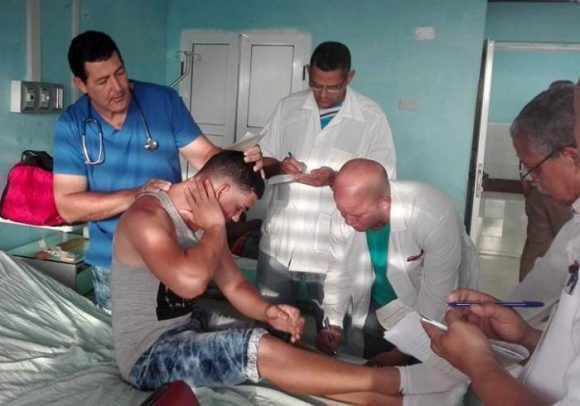
Injured patients receive care at the Camilo Cienfuegos Provincial Hospital. Photo: Cristóbal Álamo/ Escambray.
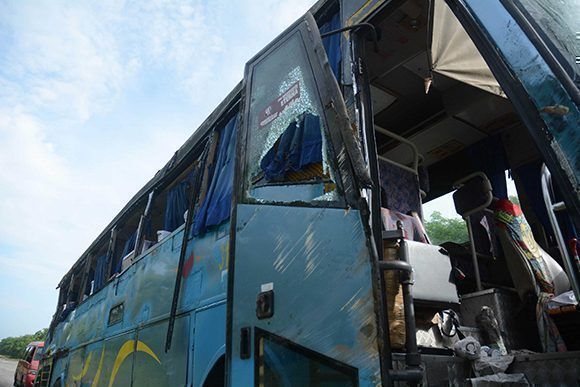
View of the right side of the Yutong bus state, involved in the traffic accident that occurred at dawn on July 28, 2018 at kilometer 327 of the National Highway, near Cabaiguán, in Sancti Spíritus province, when the bus went off the road and when trying to get on board it capsized. Photo: Oscar Alfonso Sosa/ ACN.
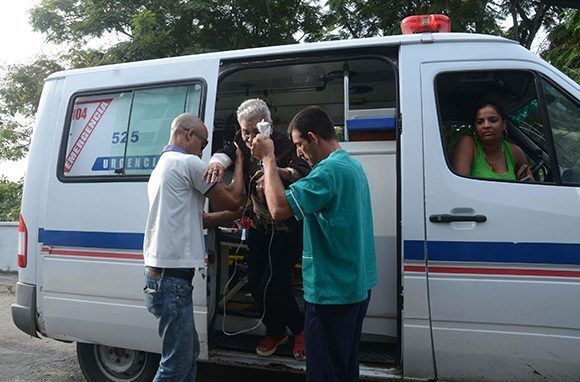
The injured were immediately taken to the Camilo Cienfuegos General Hospital in Sancti Spíritus, where they were treated on July 28, 2018. Photo: Oscar Alfonso Sosa/ ACN.
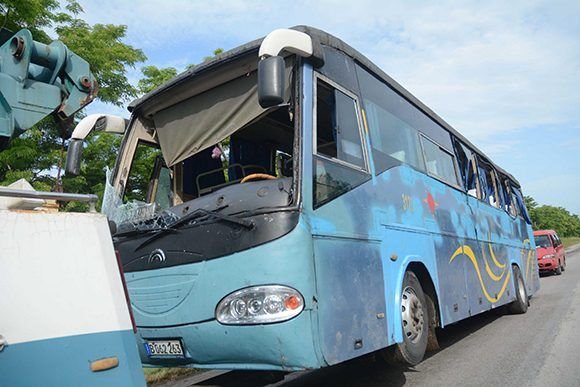
View of the state of the Yutong bus after the traffic accident that occurred at dawn on July 28, 2018 at kilometer 327 of the National Highway, near Cabaiguán, in the Sancti Spíritus province, when the bus went off the road and when trying to get up it overturned. Photo: Oscar Alfonso Sosa/ ACN.
Manolo Núñez and the Fangio Kidnapping

Manolo Núñez and the Fangio Kidnapping

By Juan A. Martínez de Osaba y Goenaga
A CubaNews translation.
Edited by Walter Lippmann.
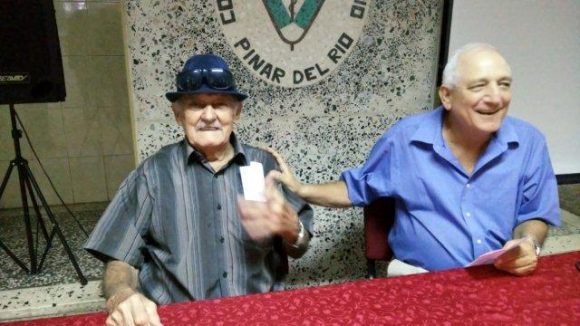
For Colonel Luis González
Manuel Núñez León, 89 years old and with seven children, is known as Manolo. He was born on September 4, 1928, at the El Rosario estate, today a Cooperative in the municipality of Puerto Esperanza. He currently lives alone in a modest house in San Vicente, between Palenque and Cueva del Indio, in Viñales. There, when he was able to locate him, Commander Faustino Pérez visited him several times.
It takes a lot of work to get words out of him that talk about himself. Always behind, against all bad things. In spite of accumulating so many years, he still has a prodigious memory and the same old mood, wearing a Carlos Gardel hat and a gray mustache. His life has been fascinating. Because of their way of being, those who pass by them cannot imagine the story they are carrying with them.
I asked him who his team was in the ball and he answered categorically: Pinar del Río. When I went further back, he repeated: Pinar del Río. After several inquisitions: “Well we were from Almendares, one was born like this”.
He is not satisfied with the film about that action: “I was invited to the presentation. When he finished they asked me what I thought and I said that some things didn’t happen like that and that the name of none of the members of the command didn’t appear. He silently accepted the explanation, because it is not purely historical, but fiction based on historical facts. He grimaced a couple of times and never came back.
The family lived next door to Los Cayos, where Antoñica Izquierdo was a transcendent figure for her preaching. They, plunged into ignorance and, in turn, helped by the enigmatic and kindly woman, took the sermons and began to heal themselves with cold water, or to try to heal themselves. Antonica, in her preaching, advised not to vote for corrupt governments, which brought her many consequences. That detail penetrated deeply into Manolo’s ideas.
The family did not vote and suffered the cruel eviction. They were placed on the side of the road with their articles and their gaze fixed on the sky, as if looking for a star to take them away or open the way for them. Several families were evicted in the style of Realengo 18 Oriental. From then on, life became much more difficult for them. Manolo recalls: “That area was owned by the landowner Pedro Blanco Torres, senator of the Republic, who demanded that they vote for him”.
According to her account, they sent thirteen wagons for thirteen families, which they took to a junction far from the Rosary, so that they could manage as best they could. The rural guard arrived and took some of the elderly prisoners to Pinar del Río. But the Cuban people have great solidarity and families in the new area took the “Bedouins” to their homes, especially the children.
Advised by several friends, he decided to go to Havana, but he was penniless. Then, in a conuco loan, he managed to sow and collect 100 quintals of malangas, which he sold for a peso each. And with the hundred pesos he went to the capital.
When I arrived in Havana, I joined the Orthodox Party of Eduardo Chibás, for which Fidel was running for the House of Representatives. I was accepted because of my revolutionary and peasant way. On Marianao’s 51st Street, Fidel made his last public speech to be elected. Coincidentally, when he finished, he called me and asked where I was from, what I was doing there and those things he was asking. I told him the story of my family and the Rosary Community. And look at the way things are, where he first came to my province, he went precisely to create the Cooperative in El Rosario. Maybe I had something to do with it. [1]
Then came the 1952 coup d’état, where all constitutional guarantees were closed and Manolo, along with other Orthodox militants, were left without a political compass, until they joined the July 26th Movement.
Juan Manuel Fangio, known as El Chueco and El Maestro, was born in Balcarce, Argentina, on June 24, 1911, and died in Buenos Aires on July 17, 1995, at the age of 84. He is considered one of the greatest motorist drivers in history and at his peak, the best.
Using the Alfa Romeo, Maserati, Mercedes Benz and Ferrari cars, as well as the Ford and Chevrolet, between 1929 and 1958 he was proclaimed five times Formula 1 world champion in the 1951, 1954, 1955, 1956 and 1957 editions.
Batista’s tyranny was trying its best to attract attention with some cultural and sporting activities, including boxing fights, as the popular uprising was growing stronger. Thus, in 1957, they designed the Cuban Grand Prix in motor racing. Fangio won unquestionably. The idea of kidnapping has been around ever since, but it was not possible for several reasons. The same could not happen now.
On February 24, 1958, the tyranny tried to re-edit the competition. Approved by the highest leadership of the July 26 Movement, Faustino Pérez, who was leading the underground struggle in Havana, planned a reckless action of universal significance and activated the command that would kidnap the great champion, led by Oscar Lucero.
The objectives set out were fulfilled to the letter: to protect the life of the champion with all our might, to demonstrate the upward force of the Revolution in arms, to avoid or minimize the connotation of the race and to draw the attention of the world to the fight against Batista.
First steps:
-It was planned to kidnap him on the exit of CMQ Television, but it could not be because of the public and the strong police protection. —The wagons were bet to execute the action; it was impossible. Among those mobilized was Manolo Núñez.
-On a visit of the champion to the National Hotel, but it was the most protected place.
-When I was walking along the route of the race around Havana’s Malecón, it was very well guarded.
And the time was passing. Then Faustino, a man of strong character and courage at all costs, said to Lucero, “You do it, or I will do it”. And from there the hero came out to accelerate the action. According to Arnol Rodriguez in his book Operation Fangio, Faustino later regretted speaking to a religious, disciplined and courageous man, who soon after became a martyr.
As is often the case, there are many versions of the event. From here we present Manolo Núñez’s:
On the night of February 23, 1958, a command of three cars (all with Thompson machine guns and handguns), loaded with three revolutionaries each and well-armed, stood in the vicinity of the Lincoln Hotel, where the champion was staying.
It was all in the blink of an eye. At 8:40 pm, Fangio went down to the hotel lobby and established his identification. The action has begun.
Manuel Uziel and Primitivo Aguilera entered the lobby and headed for the “Tres Molinos” bar. At the same time, several posts were erected. Manolo had to cover the entrance to the Hotel, machine gun in hand. Uziel approached the group where Fangio was and called him. The Argentinean was displeased: “Why do you want me?” Uziel then said: “I am from the 26th of July Movement and we are going to kidnap him”. After the surprise and with a gun to his side, the champion said, “Let’s go.
Some, perhaps from the protection team to the champion, moved suspiciously and Manolo’s voice echoed in the room: “If anyone moves again, I’ll shoot and there won’t be one left alive”. Uziel, without hesitation for a second, kept Fangio under gunfire and went out with him through the door of Virtudes Street. He then put the champion in the first car and started fast.
The hero’s eyes shine when he remembers his sentence: “We’ll be stationed here, and in five minutes nobody will leave, because nobody will die. And no one dared to leave.
The retreat took place in perfect organization, everyone went to the wagons stationed. This is what Arnol Rodríguez, who has already disappeared, tells us in the book quoted:
Immediately the three cars started moving along Virtudes Street. Oscar’s, the Black Monk, accompanied by his wife Blanquita, who was the closest to the hotel’s door, was the first one to start, although the car immediately got in front, driven by Primitivo Aguilera (El Pibe), accompanied by Manuel Uziel and Reinaldo Rodriguez, was a green Plymouth, the third a grey Buick with Carlos García (Cara Pálida) at the helm, occupied by Ángel Payá, Manolo Núñez and Ángel Luis Guiú (William)[2].
According to Manolo, Oscar Lucero’s return was the last one. There was only one obstacle, other than the kidnapping. The second one hit another and Carlos Garcia, the driver, had to go to the police station to testify. At Manolo’s initiative, they withdrew in time.
I immediately reacted: “Pale Face, you have to go with the man to the barracks because of the accident, give me your gun”. They left with the policeman, who never suspected the action, everything flowed normally. We walked along the path we were coming from and then Oscar Lucero’s car and his wife Blanquita picked us up and took us to the first place where they took Fangio: the house of Uziel.
Once at the station, the officer on duty asked them to agree among themselves, as the coup had been simple. Pale Face proposed to pay the man and everything was just as if nothing happened.
The authorities were afraid that the great champion would suffer some injury and even death, because the whole world would fall on them. They could not imagine one of the orientations: “Take care, no one should be hurt or killed, but first you, before Fangio, must protect the life of the champion at all costs…”
When I read the book of marras, I understood that in the things of life, chance plays a determining role. Maybe everything would have been pitiful. Let’s see how Arnol narrated a tragicomic anecdote in the definitive home of the New Vedado, which hosted the champion:
A few houses nearby, on the same block, lived a Tropicana dancer who was called the Mamboleta, a lover of Batista’s politician and ruler Rafael Díaz Balart. This motivated that at every moment, cars of the repressive forces parked almost in front of him, and it was the case that when Haydeé Santamaría Cuadrado and Armando Hart Dávalos, who was distracted, left the house, he went to one of those cars and only Haydeé’s quick reaction could prevent him from taking it. [4]
The outcome is known. Fangio felt at home and befriended his captors, who went out of their way to pay attention. The race took place without him and was one of the most cruel, as it skewed the lives of several fans, when a car at full speed lost control and was over the spectators. The great champion saw the accident on television and decided not to compete again.
That night of February 24, another command was created, now with the difficult and risky mission of returning Fangio.
Faustino’s order had been categorical: Well, come on, you yourself, Arnol, are responsible for the delivery. I don’t have to tell you anything else. Go in Emmita’s car and have Flavia (Berta Fernández Cuervo) accompany you. Only a few glasses were added to his usual clothing[5].
It was all just a matter of asking for it. At the proposal of the Argentine Embassy, the return was made in an apartment located at Calle 12, No. 20, 11th floor, between 1st and 3rd floor, El Vedado, in the home of Mario Zaballe, military attaché of that Embassy, who was outside the country.
That’s how Arnol remembered it:
After the doorbell rang, they opened the access door to the inside, we waited for the elevator and, once inside, we dialed the 11th floor. We penetrated and saw three lords of very serious countenances. Fangio immediately, changing his face and almost smiling, broke the ice, saying, “These are my kind kidnappers, my kidnapping friends.
The culmination of one of the best prepared actions, with a popular and international connotation, as the press around the world turned to the kidnapping of the great champion, who ended up a friend of the revolutionaries because of the attention he received.
After 1959, Manolo Núñez, whom on October 17, 2017 we had as a guest at the Peña of the Scientific Veterinary Council of Pinar del Río, would obtain military degrees and fulfilled risky tasks in the Escambray Cleanup. Among other actions, he was in charge of taking the twelve Malagones to Ciudad Libertad, to place them under the command of Commander Camilo Cienfuegos.
The champion would visit Cuba in 1981 and met with the highest authorities, including his captors.
1] Manolo Núñez: Scientific Veterinary Council of Pinar del Río, October 17, 2017.
2] Arnol Rodriguez: Operation Fangio. Editorial Ciencias Sociales. Havana, pp. 31 and 32.
3] Manolo Núñez: Idem.
4] Arnol Rodriguez: Ob. Cit. p. 36.
5] Ibid.
6] Ibid.
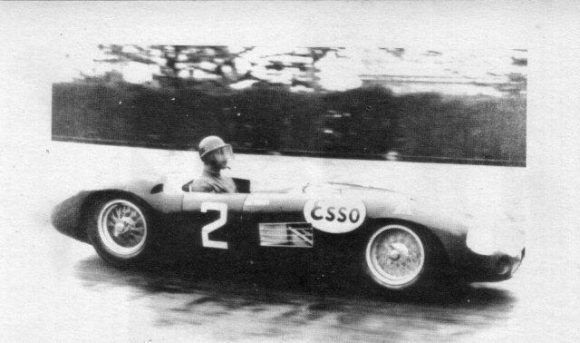
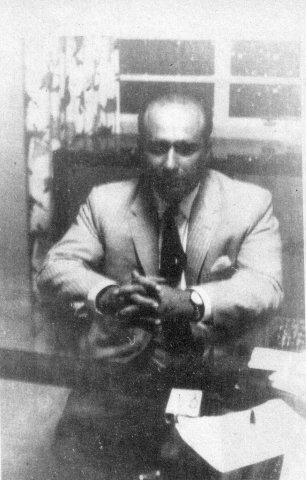
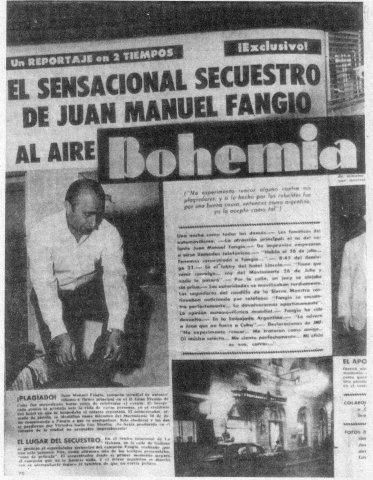
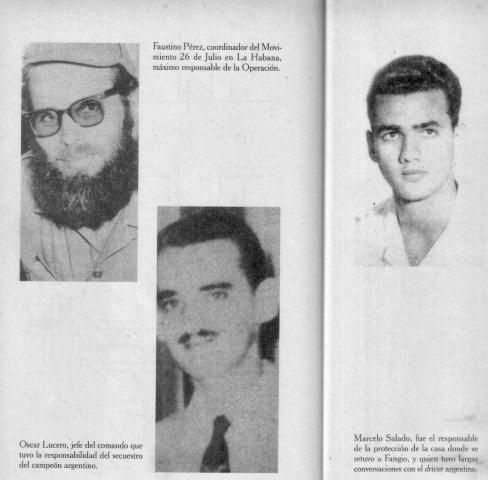
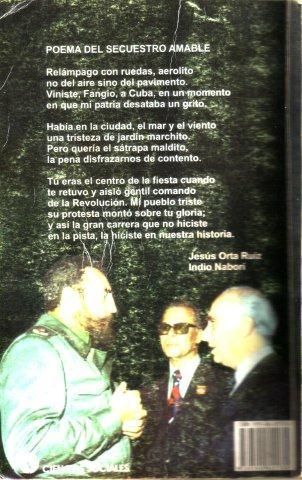
Facebook’s Intrusion into Argentina’s Elections

Facebook’s intrusion into Argentina’s elections unveiled
July 31, 2018
Translated and edited by Walter Lippmann for CubaNews.
An investigation by the British Parliament confirmed that the Facebook company conducted a secret campaign against Cristina Fernández de Kirchner in the 2015 presidential elections.
The report of the House of Commons Digital, Culture and Media Committee, entitled “Anti-Kirchner Campaign”, alludes to the existence of “alarming evidence” of Cambridge Analytica’s interference in the elections in the South American country.
The current president of Argentina, Mauricio Macri, won the presidential elections of November 2016, ending 12 years of Kirchnerist governments of Néstor Kirchner (2003-2007) and Cristina Fernández (2007-2015).
The campaign against the Argentine ex-president reportedly used “spy tactics”, “information warfare”, and “the use of retired officers from the intelligence and security agencies of Israel, the United Kingdom and Russia, in support of the British group’s mission of interference in Argentina”.
This, in addition to the manipulation of the data of at least 87 million Facebook users, and the use of fake accounts, both on that platform and on Twitter, with the aim of manipulating public opinion.
The UK Parliament expects the owner of the social network, Mark Zuckerberg, to return to the British legislature to answer questions he did not answer or answered with false information at his last appearance before the legislators.
Cambridge Analytica had already made the news about the illegal collection of information when it was revealed in March 2018 that it had had access to the account of more than 50 million users through Facebook, to support Donald Trump’s presidential campaign in 2016.
(With information from Telesur)
For Respect, Inclusion and Human Rights

For Respect, Inclusion and Human Rights
By Lisbet Penín Matos
Translated and edited by Walter Lippmann for CubaNews.
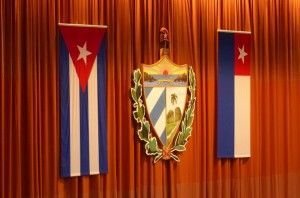 Undoubtedly one of the most-discussed articles during the recently concluded first ordinary session of the IX Legislature of the National Assembly of People’s Power was article 68, which establishes the concept of marriage between two people.
Undoubtedly one of the most-discussed articles during the recently concluded first ordinary session of the IX Legislature of the National Assembly of People’s Power was article 68, which establishes the concept of marriage between two people.
The change with respect to the current constitution is that the one approved in 1976 includes marriage as the union between a man and a woman, while the current proposal, with a revolutionary vision, does not define sex, sexual orientation, or gender identity.
In this regard, the press spoke with Deputy Dr. Mariela Castro Espín. She said during the discussion that this article mixes the rights proposed by the Constitution to guarantee the institution of marriage with the responsibilities of mothers and fathers.
“That is a technical question, I wanted to separate them because simply when it comes to operationalizing all this in the laws, it makes it easier to differentiate them, and also, it reproduces a reproductive or reproductivist vision of marriage.
She stated that there are unmarried people who, while others marry and are unable or unwilling to have them, hence marriage does not pursue only the reproductive end.
The director of CENESEX commented that marriage has several purposes, among them the desire, the pleasure of living together where shared responsibilities are assumed in the home. “That’s fine, but then marriage takes on another purpose, another project, which is that of the children.
“If we’re going to consider the reproductive responsibility of mother and father within marriage, then when we put all this into practice in the law, we have to guarantee the same options and possibilities to heterosexual couples, same-sex couples and people who decide to become single mothers or fathers,” she said.
Dr. Mariela Castro also mentioned that the current constitutional reform has a more inclusive vision. She described the achievement of human rights-based marriage as wonderful.
She commented that no person can be excluded or discriminated against for any reason. She also said that today Cuban society has more knowledge and can openly discuss these issues with the intention of protecting couples who wish to join together, without exclusion.
Despite its proposal, the National Assembly adopted that the article should remain unchanged, but that it would be enriched by the views of the people.
“That is a wonderful revolutionary achievement,” she said, and continued, “hopefully, when the document is submitted for analysis by the people, the majority will be able to understand the very important step we are taking in the field of human rights, in recognizing all the rights of people because of their sexual orientation and gender identity, because we have had difficulty reproducing the prejudices we have learned.
She reflected that there are people in the population with their dogmas, prejudices and beliefs who consider that homosexual people are not fit, capable of being mothers and fathers.
“And I repeat what I said in committee: motherhood and fatherhood is not a gift from nature, it is not an instinct as they believe: it is a learning experience”, based on observation of other mothers and fathers.
The only difference between heterosexual and homosexual mothers and fathers is simply their sexual orientation, she said.
“There are even those who believe that homosexuality is a disease, it sticks, it will be learned. No. If it were that simple, there would be no homosexuals, because they would be heterosexuals just like their parents were.
“It is an era in which this obscurantist, manipulative and retrograde thinking is being overcome with science, with scientific knowledge, inspired by the humanist spirit and based on the interest of the Cuban State in advancing the human rights agenda,” she concluded.
To make up Cuba, all the people contribute to and contribute to social and economic transformations.
This is an intentional and tempered draft project in the sense of the historical moment with the aim of guaranteeing more rights, more inclusion, independence, sovereignty and equality.
Obesity is a Health Problem in Cuba

Obesity is a Health Problem In Cuba
July 6, 2018
Translated and edited by Walter Lippmann for CubaNews.
Dr. Lilian Valdivia García, head of the nutritional support group at the National Minimum Access Surgery Center in the Cuban capital, where she works as an intensivist, told Radio Rebelde that obesity is currently a health problem in the country.
Also a specialist in General Comprehensive and Internal Medicine, Dr. Vadivia explained that a national survey on cardiovascular risk factors reported that 42 percent of the Cuban population was overweight, of these, 47 percent were female and 37.6 percent were male; the most worrying thing was that 13 percent of the total are children, and as a result they are exposed to serious diseases.
The above, he said, has an impact on health, because if not taken up in time, these infants will become obese in adolescence and later as adults with risk factors for hypertension, diabetes mellitus, hypercolestoremia, ie, increased fat and incidence of diseases such as heart attacks, cerebrovascular diseases and increased incidence of high blood pressure, among others.
“Many patients who come to our consultations with these diseases respond favorably to a diet plan that makes them lose weight, thus compensating for their diabetes or stop being so, and others eliminate hypertension.
Dr. Valdivia Garcia also said: “As for the types of obesity, we classify the weight of the patients according to their body mass index; we calculate the size squared and divide it by the kilos of weight they weigh.
He explained that a person’s normal body mass index should be between 18.5 and 24.9; when it is above 25 and 29.9 it is said that the patient is overweight, and after 30 is considered obese, according to the different degrees that has this condition that indicates that when the body mass index is 40 corresponds to super obesity.
He categorically affirmed that this evil is preventable from childhood. A person becomes obese, among other causes, because he or she begins to have bad eating habits from a very early age. “It’s not that they don’t eat jams,” he says, “but that’s one day, without being the essence of the infant’s diet; parents usually offer them empty calories, such as soft drinks, sweets or candy.”
For Dr. Valdivia, good nutrition is provided by a balanced diet: “It is considered that in the first place are cereals and fruits, then vegetables, followed by proteins as a contribution of essential amino acids, then dairy products for the body that is not capable of producing them and then what I say to patients are the “whims” or jams, known as empty proteins that should be eaten one day as something exceptional.
The population has the false concept that only meat is protein,” he said, “but so is a dish of rice and beans because legumes are legumes; eggs are also a protein with the highest biological value that exists. Sometimes they go to the agricultural market and instead of buying fruits and vegetables, they choose empty calories and other products that do not provide the body with vitamins or other necessary nutrients.
Dr. Valdivia also pointed out the importance of becoming aware of the harmfulness of inadequate dietary habits to human health; each person has the power to stop the growth of overweight and obesity – she said categorically.
(Taken from Radio Rebelde)
Why did Google get a license to enter Cuba?
Why did Google get a license to enter Cuba?
By Arthur González
June 9, 2018
Translated and edited by Walter Lippmann for CubaNews
Never before has the U.S. government allowed Internet access to Cuba, nor the use of under-sea cables that pass near its coasts or other facilities. Many Internet sites are banned from the island because of the 59-year economic war. However, Barack Obama approved a license for Google to enter Cuba. What were the reasons for that decision?
To help Cubans access more scientific, technical and other information to improve the Cuban economy?
Definitely not. Definitely not. Access restrictions still remain in many of these areas, the real objective was to reach Cuban youth with their distorted information, symbols, and values, as Obama himself stated:
“…we can do more to support the Cuban people and promote our values through commitment. “The changes introduced in our new policy will further enhance our goal of empowering the Cuban people. […] and provide them with new sources of information…”
Of course, Cuba must take advantage of this opening, however small it may be. [We want] to go out into the world and make our truth known, to defeat the media campaigns that overflow the network of networks with lies, such as false claims of violations of the rights of Cubans, to share Cuba’s achievements, achieved with effort and sacrifice, despite the damage caused by the criminal policies of the United States.
It is the opportunity to tell the world about the terrorist acts carried out by the U.S. government, the biological warfare which affected the people and the persecution of all the foreign banks and companies that try to establish business with Cuba.
In order not to be naïve, Cubans must be aware of what lies behind Obama’s [granting of the] license and why Donald Trump maintains it, despite having taken steps to dismantle many aspects of his predecessor’s policy, including the Presidential Directive, which sought to kill the people with honey, rather than with whips.
During his presidential campaign, Donald Trump took on the reactionary and ultraconservative language embodied in the Republican Party Platform, which sets out, among other things, the following points:
“The opening of the current Obama administration to Cuba was a shameful accommodation to the demands of the tyrants. They will only strengthen that military dictatorship. […] We demand an aerial platform for Radio and TV Martí broadcasts, and the promotion of Internet access as a technological tool to strengthen the pro-democracy movement in Cuba.”
Since his arrival in the White House, Trump has delivered on his campaign for the presidency, but he has not changed the license granted to Google for Cuba. In recent days he allowed Google’s executive president, Eric Emerson Schmidt, to travel to Havana in the company of Republican Senator Jeff Flake. Their background speaks for itself.
In 1996, the RAND Corporation of the United States National Defense Research Institute conducted a study for the Defense Department entitled “Cuban Communications, Computer Networks and their Implications for U.S. Policy.
That work puts forth the need to help open up Cuba and to force the emergence of an independent civil society, for which it states:
“It is necessary to encourage Cuba’s link to the Internet, to use it to transmit balanced news and analysis, to promote its use by Cuban NGOs, universities and other audiences.
Insisting on that, in March 2005, ultra-conservative Roger Noriega, Under Secretary of State for Western Hemispheric Affairs, testified at a congressional hearing:
“The United States has relaxed licensing requirements so that, for the first time, high-speed personal computers can be delivered to civil society groups.
During an event held in 2012 at the Heritage Foundation, in conjunction with Google Ideas, a report was prepared recommending that the U.S. government create a remote WIFI network to enable Cubans to access the Internet.
In that gathering Republican Senator Marco Rubio was present. He said:
“The Cuban totalitarian system could collapse if all Cubans had free access to the Internet, because Cuba would follow the same fate as those countries that spent the Arab Spring.
The State Department announced on June 13, 2013, proposed projects to promote democracy and human rights in Cuba, including the use of digital tools to be used, selectively and safely, by the civilian population, along with other programs to promote equality and defend the social networks of black Cubans.
Programs created for subversion in Cuba such as Zunzuneo and Conmotion, the latter designed by the Open Technology Institute at The New America Foundation, were promptly denounced.
We welcome full access to the Internet, because Cubans are sufficiently prepared to know how to differentiate between the useful and the subversive, but in the face of an enemy that has not stopped attacking for more than half a century, we must always be alert and, as José Martí said:
“Do at every moment what is necessary at every moment”
Subscribe to Blog via Email
| M | T | W | T | F | S | S |
|---|---|---|---|---|---|---|
| 1 | ||||||
| 2 | 3 | 4 | 5 | 6 | 7 | 8 |
| 9 | 10 | 11 | 12 | 13 | 14 | 15 |
| 16 | 17 | 18 | 19 | 20 | 21 | 22 |
| 23 | 24 | 25 | 26 | 27 | 28 | 29 |
| 30 | 31 | |||||


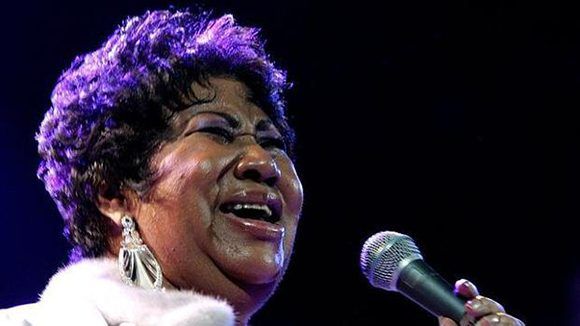
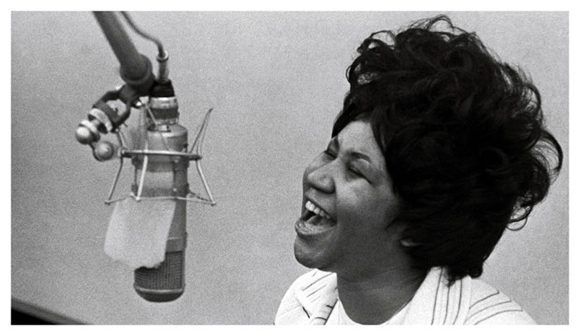
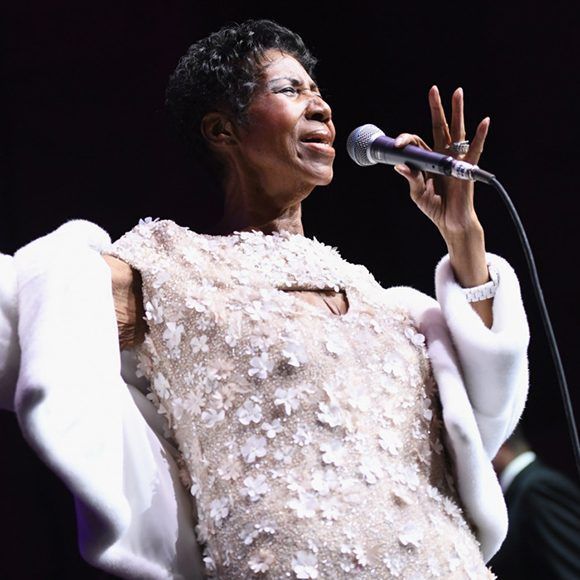

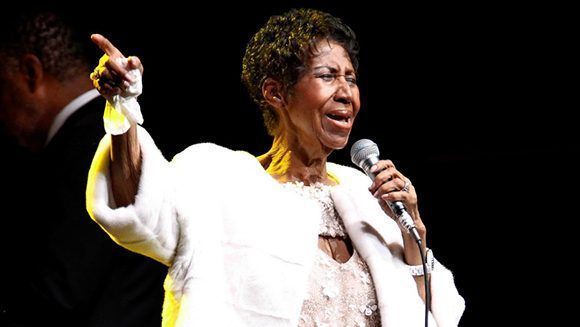

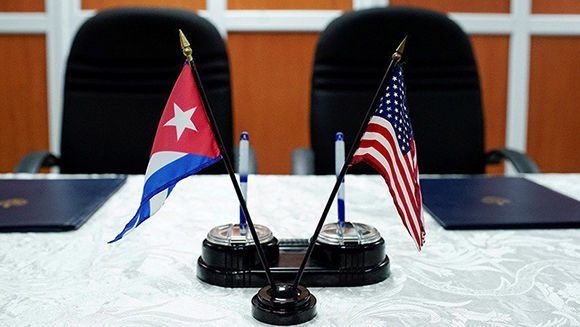


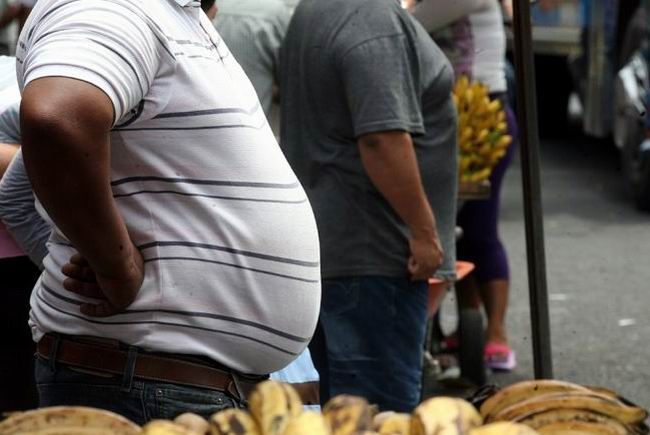
You must be logged in to post a comment.